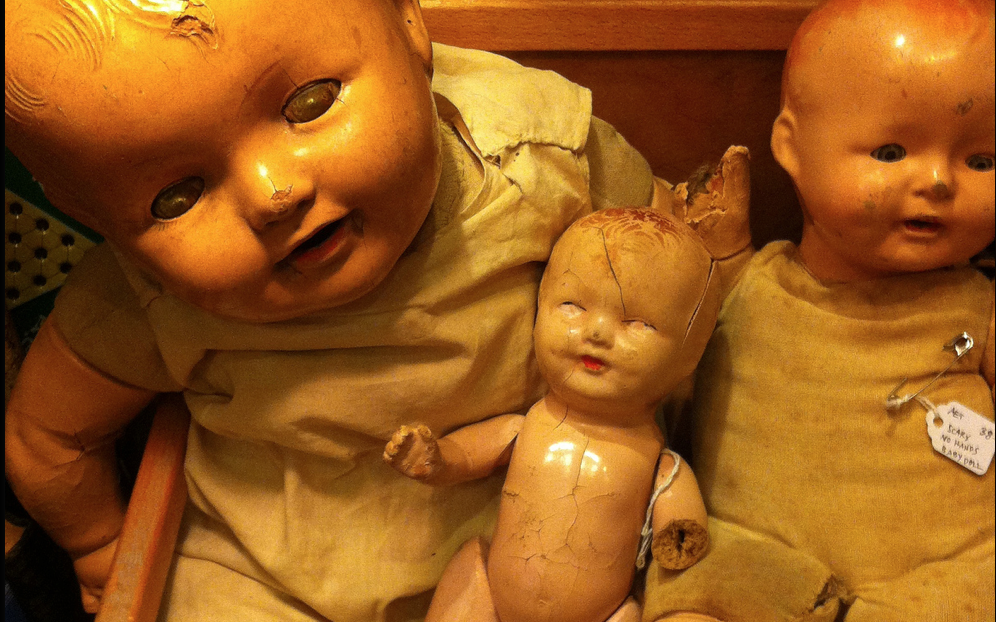5.13 Afternoon Inquisition
The lovely LadyMitras won last week’s Comment o’ the Week and therefore today’s AI is all hers. It’s so good that I forwarded it to the other Skepchicks with a note asking if someone could write a longer post on it, before I finally realized that it was in fact her AI entry. Can’t wait to see your responses!
+++
I have a three year old son. When he was two, some unfortunate events happened in my life which forced me to seriously reflect on my religious beliefs and figure out how I should raise my son.
The kid had gotten no religious upbringing. I was worried that I’d been a neglectful mother. After all, if a parent accomplishes nothing else, shouldn’t they at least make sure their kid doesn’t burn in hell forever? I knew I owed it to him to do some research and be 100% certain I’m raising him right.
After many months of prayer, reading the bible, talking to people and researching on the intarwebs, I came to the realization that no religions are backed with evidence.
So, my son is the first child in my family to be raised without faith. I don’t want to indoctrinate my son and I do want him to be able to think for himself.
How does a skeptical parent teach a young child to think critically without crossing the line into indoctrinating the child into the ways of skepticism?





Show the child that their actions have consequences and broad ones sometimes. When they do something, right or wrong, ask them how it would make them feel, and how others feel about it. Show them that our actions have an impact on others, the environment, your pets, society, etc.
I’m also starting to teach my daughter to find answers on her own. In books and by asking others. Encourage curiosity, creativity, interests in music and art.
I will just refer you to the excellent anthology “Parenting Beyond Belief”, which addresses these questions directly and from multiple points of view. Bottom line is that non-believers are not the type to seek easy answers, and there are none here, but you can raise your children without dogmatic indoctrination.
@disownedsky: Link to that Book. Thanks! I’m going to the book store later to check it out.
You know, my parents weren’t skeptics OR religious folks. My mom became a “born-again” of sorts after a battle with drug addiction a few years ago (thankfully she’s not really loud about it), but other than that, neither of my parents have been big on religion.
We went to Sunday School, but only because it was less than a mile away and all of our friends went, too. There was no other regular church-going. I went to church a few times with friends, but that was about it. Considering the small town I grew up in, that was pretty progressive – religion is a big deal with everyone I grew up with.
My dad is a HUGE nerd/geek, and way into science. I never got the feeling he even believed in god — he never really spoke about it one way or another — though I know he’s always been interested in learning about different religions (there are a lot of Mormons in my home town, and he was always really curious about it, because he found it fascinating). I definitely know he is not a fan of crazy religious nuts. I was always certain my mom believed, but she didn’t talk about it much or force it on anyone. I think her dad was pretty religious (I never knew him), but her mom, my very quirky grandmother, is decidedly not.
Basically, my parents never made religion a big deal. God came up on occasion, but I never felt forced to believe (my mom might not LIKE that I identify as an atheist, but she’d never tell me I was going to hell). They never balked if we wanted to go to church with friends (my younger sister was mostly into this), if it was something we wanted to do, and they didn’t seem to notice or care if we didn’t want to go to church. I don’t remember going to church with either parent (except a few funerals and weddings).
In the end, my twin sister definitely believes in god and even goes to church with her kids sometimes, but I’d call her a liberal Christan. I grew up into an out atheist. My little sister is iffy, kind of moving about from atheist to Christian depending on who she is hanging with at the time, but she has … issues, so it’s hard to say with her.
My parents, especially my dad, are open-minded, love asking questions, and ALWAYS told us that we could make our own decisions when it came to our lives — including religion — and in the end, that is exactly what we did!
@marilove: COTW!
And I want to add, my parents were always really open and CONSTANTLY asking questions. Like, constantly. And my dad was all about taking us to the library and stuff, and letting us read whatever we wanted. He once had to tell the library lady to let me in the adult section, because I had gone through all the kids books, lmao.
They didn’t hide stuff from us, they encouraged free thought, they asked questions, they encouraged US to ask them questions, and they never, ever lied.
My mom was ESPCIALLY open about sex, and I really thank her for that. She taught me not to believe the bullshit that adults like to teach kids about sex (“THAT IS NOT TRUE! Here’s a book about sex.)
I plan on asking questions. I’m going to take my kids places and show them how people live and let people tell them how they think and when we get home, I’ll ask my kids what they think. We’ll discuss things and I’ll do my best not to pressure them into saying one thing or the other, but I will require them to defend their positions when they take any.
@Outsider: You basically said what I said, but in a less personal way, and much shorter! LMAO!
My parents made me a skeptic by accident. They were bible thumping, crazy conspiracy theorists. Being taught to study the Bible taught me about source documents and context of statements. Being taught creation science taught me to question the status quo. Conspiracy theories are sort of like science for weeinies. You form a hypothesis, gather data, peer review with other wackos.
I’m doing the same things with my daughter, on purpose and without the tinfoil hats.
I mean, the same things with skepticism as worldview. I’m not teaching scripture. Yuck.
Always remember that skepticism is the means, not the end. If all you’re teaching your children is that psychics aren’t real, or God doesn’t exist, or homeopathy doesn’t work, without teaching them how we know these things, then you aren’t actually teaching skepticism.
Teach children how to practice skepticism and the value of doing so, and there’s no need to indoctrinate them in skepticism’s conclusions. They’ll come to them on their own.
I’m surprised, actually discouraged is a better word, at how many people believe spirituality is tied exclusively to a religion. When in fact, spirituality can be as simple as a secular philosophy on improving society and the human race. through community service and other non-religious activity.
@Outsider: Isn’t that called Humanism? I’m all about community service and improving society, but I do NOT consider myself spiritual.
I try to stay away from the word “spirituality.” Ambiguous definitions scare me.
Fair enough.
I’m just finishing up Humanism for Parents which is OK, but I’m more interested in Parenting Beyond Belief. Right now I’m sticking mostly to asking my kids what they think.
Daughter: Are fairies real?
Me: Well, what do you think?
Daughter: I don’t know. I’ve never seen one, but Omi says they are.
Me: Does she?
Daughter: Do you?
Me: I haven’t ever seen any, so I can’t say for sure.
It’s not ideal, but she’s five. I’m trying not to dictate to her what to believe but to encourage her to think for herself.
One thing I’m adamant in teaching her to be skeptical about however is commercials. Every time a commercial comes on and she starts to say “oooh, look at…” I say “Remember: all commercials are lying to you. No matter what they might be saying, they are lying to you. Don’t believe it.”
@Aaron: Yeah, this. Spirituality to me and the majority of people points to either religion/god or some other kind of woo, not critical thought.
Two questions: How do we know that? How can we find out?
Or just ask “Why?” over and over and over and over and over.
I came to a similar conclusion LadyMitras did but only after my two children were well into their school years. My 18 year old son now shares my skeptical non religious outlook. My wife and 15 year old daughter are what I’d call rational and critical thinking Christians. I guess you know what you know, or realize what you don’t know, when you know it.
Small children tend to think in terms of narrative and story and we always told our kids that believing in any magical creature from a story is never required by the story teller and not necessary to enjoy the story. If I were starting over I’d tell my kid’s that religions are similar to many magical tales that started as ancient tribal stories of explanation that some people still feel a need to believe’ despite current knowledge and the clear fictional, cultural and mythic beginnings of most religious stories.
LadyMitras, you phrase the question as if it were a black/white issue. I have always felt that atheism was a result of skeptical thought, not the result of indoctrination. If you focus your guidance on the process of critical analysis and not on reaching a desired conclusion the subject of religion need seldom arise.
We raised two sons without once stepping into a church with them. And yes, we had the normal complement of religious grannies and such. If one or the other son asked about God, we were willing to discuss what others believed. We simply stated that such a belief did not fit with our own thoughts. Further, we wanted them to know that each person has the right to decide what works for him. We encouraged them to address anything that came to their attention, whether it be religion, science or sports with a critical, questioning mind and then to decide for themselves what worked. Specifically, we did not discourage their attendance at other people’s churches, under the assumption that the forbidden fruit is tastier than the readily available pickle.
We never said, “We don’t believe that.” We said, “That doesn’t work for us. Maybe when you get older, you will have given it enough thought to make your own decision on it.” The boys are now in their forties. Neither of them has raped, pillaged or gone to hell yet.
The best things you can teach children is to not only question everything but to learn how to answer their own questions – either through experimentation or research. When I asked “why” questions of either my CPA mother or engineer father, the answer was rarely “yes” or “no” but, “Let’s find out.”
I have a little niece who is almost four. I don’t presume to teach her about religion, but what I do do is always ask questions and (very important!) listen to her answers. Have a Socratic dialog with your kids. If they ask a question and you don’t have the answer, have references handy. Teach kids to think and they will probably become good skeptics.
@Aaron: Aaron – you nailed it. We don’t teach what to believe or not believe, we teach why things should or shouldn’t be believed, based on evidence and reason. COTW, sir.
I don’t know how. Both my kids (now in their late ’20’s) are agnostic/atheisitic because they took after me instead of their mom or grandparents (though my ex’s mother snuck them out to be baptized when she was supposedly babysitting).
They saw the hypocrisy of the believers as they were growing up and that also had a bit of influence (especially on the part of the above-mentioned grandmother’s church folks & priests).
I have two boys, 8 and 5, and we are atheists. I was raised Mormon, so I wanted to run as far away from organized religion as I could.
That said, I always tell my boys that some people choose to believe, but Mom and Dad don’t because it doesn’t make logical sense to us. I also tell them when they are old enough, they can make their own choices, and we can always discuss any questions they have with trips to the library, or yes, even going to a church service if that is what they want to experience. But we were not going to tell them what to believe. It was up to them to decide.
I can only second the sentiments expressed about teaching them to learn, and evaluate evidence. Those skills will take any child in a good direction, whatever direction that might be.
My personal experience might be of some use. I was taken to church regularly, but it wasn’t kept from me that my father didn’t really believe, he went along and even participated in church organizations as acts of family unity and community. So, I knew that at least to some, the good works were more important than the belief. I also was shown it’s ok not to believe. I read a lot of mythology, and could plainly see the parallels between those stories, and the ones at church. They were fiction, with a point, and getting the point and enjoying the story were important, belief wasn’t the only virtue (it took me much longer to decide it wasn’t a virtue at all). And being introduced to science. There’s enormous awe and wonder in science. Our stories are better than theirs, and have the added benefit of being true. Billions of years! We’re made of freakin’ STAR STUFF. Go back far enough, and our ancestors are creepy, slimy things, and creepier still if you go farther back. that’s SO COOL to a little kid. At least to a dorky one like I was.
A skeptical parent may naturally worry about “indoctrinating” their child, but don’t forget: children become teenagers. That’s a whole phase of not trusting one’s parents and seeking one’s own answers.
Is it possible not to indoctrinate a child?
According to every definition of indoctrinate that i’ve seen the answer would be no. Unless you don’t teach the child anything. So go ahead and indoctrinate them with critical thinking skills. We don’t need to pretend that that is somehow just as bad as indoctrinating them with things like creationism. It’s not and we all know it.
We have conversations with our daughter about religion and science as she brings up the topics, but I’d say we are less interested in raising her as a skeptic than as someone who can use her imagination to consider consequences. So the other day when she was asking whether, if there were a heaven, we supposed that it would be full of books, my wife pointed out to her that a lot of the people who have ever lived were preliterate and wouldn’t be able to read them, so it wouldn’t necessarily be a good place for them if so. I pointed out that they might be able to learn to read in heaven, so it might be good after all. Our daughter was not told, “There is no heaven,” (my working hypothesis) or “There is no evidence one way or the other on the existence of heaven” (my wife’s position) but was rather encouraged to think critically about what the ideal environment (what heaven is supposed to be) would be like.
Surely the teaching and encouragement of critical thinking guards against that kind of indoctrination, as long as you are aware of your own biases and are able to consider your own positions
I agree with those that are saying that some level of indoctrination of children is inevitable. Just try to indoctrinate them with critical thinking skills so that they can effectively evaluate the world once they grow older.
Personally, I was not raised in a Christian household, but a Unitarian Universalist (UU) one instead. This particular church did pretty well for me by exposing me to a lot of different religions and religious practices so that I could at least see that none of them have a monopoly on truth. The UU churches do tend to attract a lot of woo believers so some of our “exposure” was a little more serious about new age stuff than I would like in retrospect, but it mostly worked for me at the time. I think that exposure is helpful so that kids see that people like them celebrate different holidays and believe different things, but the people themselves are not that different.
Don’t tell them answers but given them the means to discover the answers themselves. I never told my kids that Santa wasn’t real, there was no need as they shed these childhood myths quite easily on their own. Santa and gods rely on the same sort of magical thinking. If kids ask where Xmas pressies come from and are presented with several choices they will choose the one that fits the evidence if prompted to seek an answer. It is only assumptions that are allowed to lie still that form into unshakable beliefs.
Take a leaf out of Buddhism and encourage children to question everything for themselves, even the words of the Buddha…or teacher.. or parent.
For me I answer their questions honestly, especially when I don’t know the answer. Then I work with them to find an answer to the question. This way they learn that being ignorant and being wrong are different and thanks to the internet I can teach them to assess the information they find to make sure it’s accurate.
I never pretend to have all the answers.
As they get older I introduce more critical thinking. Last fall on a road trip my daughter (then 9) was thrilled every time we’d pass through some exhibit and end up in a gift shop. I explained Barnum to her and the reasoning behind promoting sales. Now when the same happens she doesn’t ask me to buy crap, she smiles at me knowingly because she’s smart enough to not be fooled by cheap marketing. She still get’s joy and confidence from that one lesson when a toy or ice cream would have been long forgotten.
Though we do buy a fair bit of ice cream ;)
My parents only started taking us to church after my older sister asked why we didn’t go to church like all her classmates. That said, my mother is a believer (though a smart and liberal one) while my dad admits to not believing. Both of my sisters and I ended up as atheists after traveling down various paths into and out of belief.
However, I have thought about this question quite a bit as it pertains to my daughter. My ex-wife is a believer who has described me as “a rabid atheist” after I finally started calling myself an atheist rather than an agnostic. I try not to be dismissive or mean about anyone’s belief systems, especially in front of my daughter (and especially, especially about her mom.)
…wow…is especially really a word?…yes…but if you say it too often it sounds really weird…
At any rate, instead of counter-indoctrinating my daughter I am trying to help her learn to observe and question and figure out answers for herself.
She’s only 6, so it’s hard to tell just how successful I have been to date. Right now she still believes in god, Santa, the tooth fairy, and the easter bunny. (And this house of cards was constructed without my help. Thank you bizarre American culture.)
@Grimmstail:
I just wanted to comment that I love saying I am an atheist (as opposed to agnostic). I live in the liberal crazy San Francisco area, and it’s amazing how when I say I am an atheist, it’s a complete conversation stopper. People really don’t know what to say.
I have a simple rule:
Teach children (and anyone else as appropriate) *how* to think, not what to think.
I too ,have a SO. Baptist upbringing. I’m over 50 and my parents were brought up during the Skopes monkey trial and the McCarthy times. Christianity was what you were required to be to be a good American. As a kid ,the Tetonic plate theory was just being talked about and the extinction of the dinosaurs was in question.
I grew up a believer but the science and the Bible did not mesh. I stopped going to church after I joined the military and started to attend classes after work to understand what the “other side” was talking about.
After a while the Science won out and then my wife and I had a baby girl. Now, how to bring her up?
I first thought to bring her up in a typical Christian house hold but when we started attending services I could not believe that the believers thought that Noah brought tiny dinosauers on the boat with him. I couldn’t believe people still thought that way.
One day I was surfing the web and I thought to myself ,what was atheism all about? I found the American Atheists site and I found a “home”.
After some time reading articles on that site and others I determined that my daughter would not get a religious upbringing. I will teach her how to think critically and then stand back and let her make her own decision. If she chooses a religious belief I will still love her. Not like my family who dis -owneded me after I “woke up”.
@Satans Parakeet: We attend a UU church, and I would agree that there is a lot of woo about the New Age or Quantum Thought in some congregations. But there are also rationalists and a handful of atheists and agnostics.
@tiger kitty: It can also be a conversation starter. I admitted to a coworker that I was an atheist, and she said that she was glad to hear that because she was starting to think she was the only one around who thought that the whole god thing was unbelievable.
@martinmpms:
I am sorry your family dis-owned you. I am in the same boat (mormons), although they do talk to me, it is very strained. My children barely know their grandparents.
@Brian’s A Wild Downer: What he said.
By will or by accident kids will absorb knowledge and ways of thinking from their environment. Making sure that the knowledge and ways are the ones you consider best isn’t indoctrination, it’s parenting. Well, actually it’s both.
Maybe though you should actually feed them false information occasionally, to train them in the idea that there’s no shame in discovering you’re wrong.